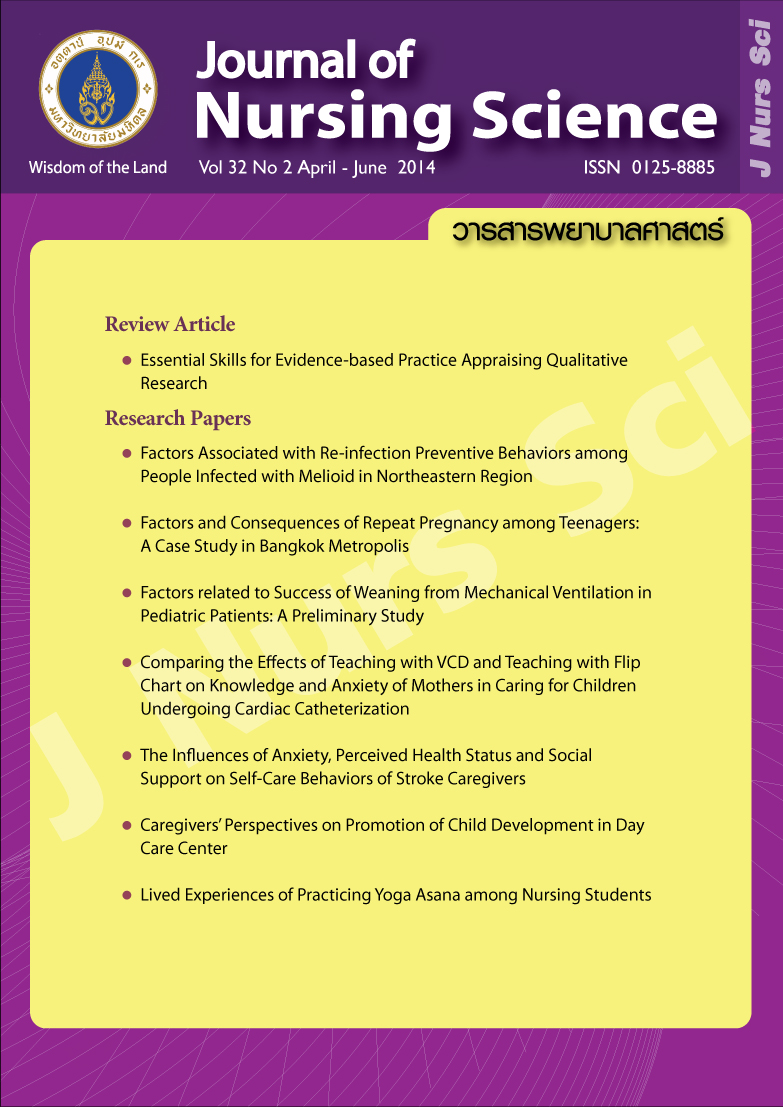The Influences of Anxiety, Perceived Health Status and Social Support on Self-care Behaviors of Stroke Caregivers
Main Article Content
Abstract
Purpose: To study the influences of anxiety, perceived health status and social support on self-care behaviors of stroke caregivers.
Design: A correlational predictive design.
Methods: The sample comprised seventy-eight primary family caregivers of stroke patients who had provided care for patients at least one month after discharge. Data were collected at the outpatient department of Siriraj hospital by using questionnaires about personal information, anxiety, perceived health status, perceived social support and self-care behaviors of stroke caregivers. The data were analyzed by using descriptive statistics and multiple regression analysis.
Main findings: Most of the subjects were females (85.9%) with a mean age of 51.69 years old. Most of the sample (89.7%) had good self-care behaviors and 71.8% had good perceived health status. More than half of the sample (60.3%) had moderate social support and mild anxiety (57.7%). Multiple regression showed that anxiety, perceived health status, perceived social support jointly explained 40.7% of variance in self-care behaviors of stroke caregivers (R2 = .41, p < .001). Predictive factors of self-care behaviors of stroke caregivers were perceived health status (β = .39, p < .01), anxiety (β = - .23, p < .05) and social support (β = .21, p < .05).
Conclusion and recommendations: Nurses and health care team should assess perceived health status, anxiety of caregiver and social support. These information will help nurse to promote perceived health status, reducing anxiety, and providing informational social support in order to increase self-care behaviors of stroke caregivers.
Keywords: anxiety, perceived health status, social support, self-care behaviors, stroke caregivers
อิทธิพลของความวิตกกังวล การรับรู้ภาวะสุขภาพ และการสนับสนุนทางสังคมต่อพฤติกรรมการดูแลตนเองของผู้ดูแลผู้ป่วยโรคหลอดเลือดสมอง
บทคัดย่อ
วัตถุประสงค์: เพื่อศึกษาอำนาจการทำนายของความวิตกกังวล การรับรู้ภาวะสุขภาพ และการสนับสนุนทางสังคม ต่อพฤติกรรมการดูแลตนเองของผู้ดูแลผู้ป่วยโรคหลอดเลือดสมอง
รูปแบบการวิจัย: การศึกษาความสัมพันธ์เชิงทำนาย
วิธีดำเนินการวิจัย: กลุ่มตัวอย่างคือ ผู้ดูแลหลักที่เป็นญาติของผู้ป่วยโรคหลอดเลือดสมองที่ให้การดูแลผู้ป่วยมาไม่น้อยกว่า 1 เดือน ภายหลังผู้ป่วยจำหน่ายออกจากโรงพยาบาล จำนวน 78 ราย เก็บข้อมูลที่ตึกผู้ป่วยนอก โรงพยาบาลศิริราช โดยใช้แบบสอบถามเกี่ยวกับข้อมูลส่วนบุคคล ความวิตกกังวล การรับรู้ภาวะสุขภาพ การสนับสนุนทางสังคม และพฤติกรรมการดูแลตนเองของผู้ดูแลผู้ป่วยโรคหลอดเลือดสมอง วิเคราะห์ข้อมูลโดยใช้สถิติเชิงพรรณนา และการวิเคราะห์ถดถอยพหุคูณ
ผลการวิจัย: กลุ่มตัวอย่างส่วนใหญ่เป็นเพศหญิงร้อยละ 85.9 มีอายุเฉลี่ย 51.69 ปี กลุ่มตัวอย่างส่วนใหญ่มีพฤติกรรมการดูแลตนเองในระดับดีร้อยละ 89.7 และการรับรู้ภาวะสุขภาพอยู่ในระดับดีร้อยละ 71.8 มากกว่าครึ่งหนึ่งของกลุ่มตัวอย่างมีความวิตกกังวลในระดับน้อยร้อยละ 57.7 และได้รับการสนับสนุนทางสังคมในระดับปานกลางร้อยละ 60.3 และการวิเคราะห์ถดถอยพหุคูณพบว่าการรับรู้ภาวะสุขภาพ (β = .39, p < .01) ความวิตกกังวล (β = - .23, p < .05) และการสนับสนุนทางสังคม (β = .21, p < .05) สามารถทำนายพฤติกรรมการดูแลตนเองของกลุ่มตัวอย่างได้อย่างมีนัยสำคัญทางสถิติ โดยตัวแปรทุกตัวสามารถร่วมกันทำนายพฤติกรรมการดูแลตนเองของผู้ดูแลได้ร้อยละ 40.7 (R2 = .41, p < .001).
สรุปและข้อเสนอแนะ: พยาบาลและทีมสุขภาพควรมีการประเมินการรับรู้ภาวะสุขภาพ ความวิตกกังวล และการสนับสนุนทางสังคมของผู้ดูแล เพื่อเป็นข้อมูลในการพัฒนาแนวทางในการส่งเสริมให้เกิดการรับรู้ภาวะสุขภาพ ลดความวิตกกังวลของผู้ดูแลและให้การสนับสนุนทางสังคมที่เป็นประโยชน์ในการดูแลตนเองที่เหมาะสมกับผู้ดูแล ซึ่งจะส่งผลให้ผู้ดูแลมีพฤติกรรมการดูแลตนเองเพิ่มขึ้น
คำสำคัญ: ความวิตกกังวล การรับรู้ภาวะสุขภาพ การสนับสนุนทางสังคม พฤติกรรมการดูแลตนเองผู้ดูแลผู้ป่วยโรคหลอดเลือดสมอง
Article Details
Copyright Notice: Nursing Science Journal of Thailand has exclusive rights to publish and distribute the manuscript and all contents therein. Without the journal’s permission, the dissemination of the manuscript in another journal or online, and the reproduction of the manuscript for non-educational purpose are prohibited.

Disclaimer: The opinion expressed and figures provided in this journal, NSJT, are the sole responsibility of the authors. The editorial board bears no responsibility in this regard.


